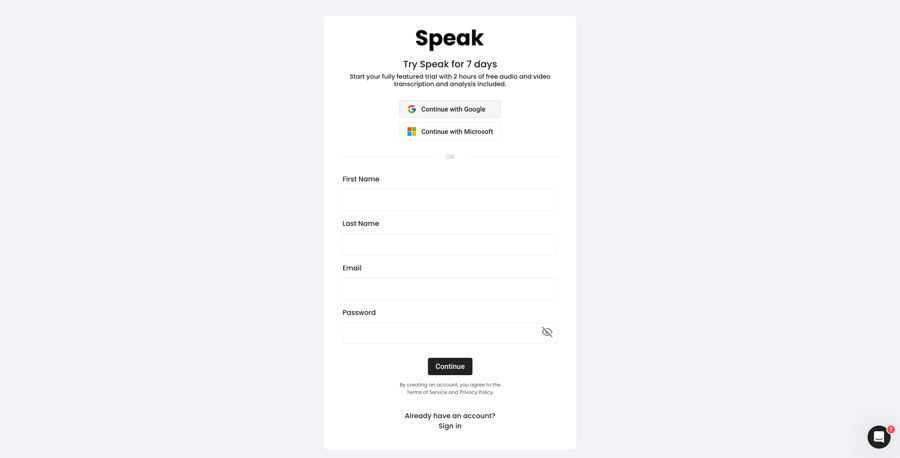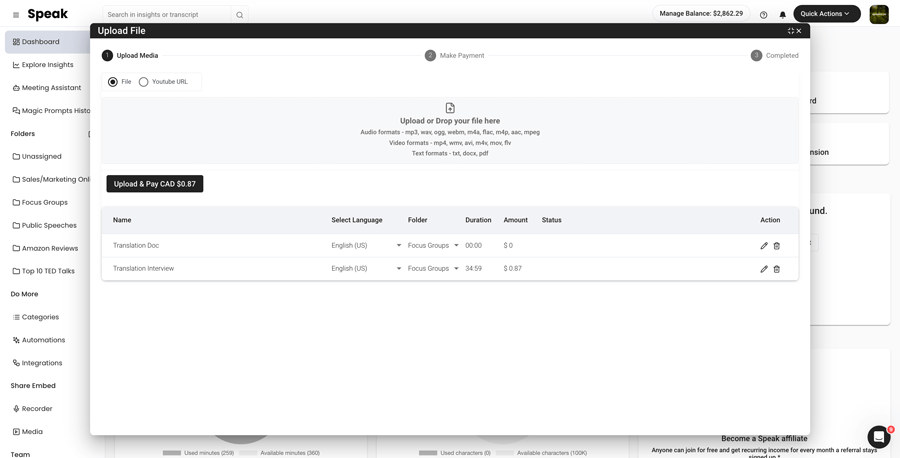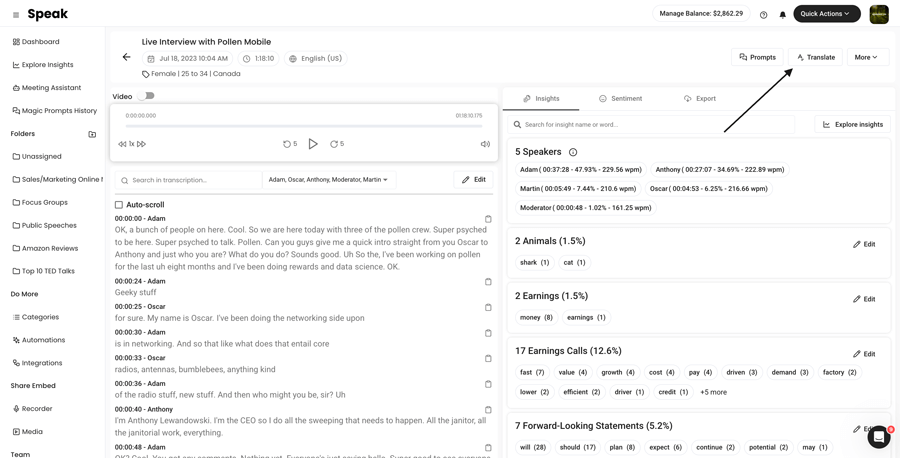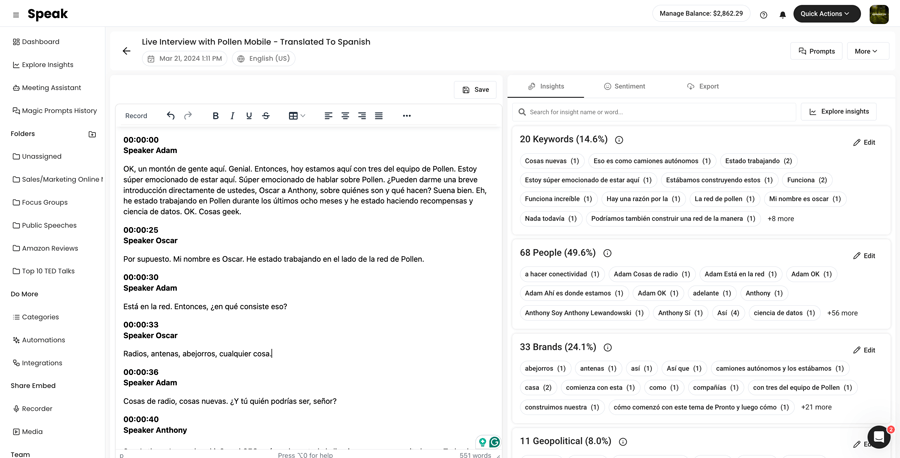How To Translate Japanese to German (Swiss)
Translating Japanese to German (Swiss) is super simple!

Step 1: Register for Speak
Register for Speak using this link.
Once you register, you can instantly begin translating your Japanese to German (Swiss) file(s).

Step 2: Upload Your Japanese file(s)
As soon as you log in, you will be redirected to the dashboard.
Once there, you can select the Quick Action "New Upload".
In Speak, you can seamlessly upload, transcribe and translate audio, video and text files all at once!

Step 3: Translate Your Japanese file(s) to German (Swiss)
Once the file is uploaded, simply visit your file and select "Translate".
If it is an audio and video file, Speak will ask you if you want to keep the speaker names and timestamps in the translation.
Want to translate many files at once? No problem!
You can view the files you want to automatically translate from Japanese to German (Swiss) from the folder level and instantly translate as many files as you need with our artificial intelligence translation in just a few clicks.

Step 4: That's It! View, Analyze, Modify & Export Your New German (Swiss) file(s)
Once the translation is done, you will be alerted and you will see a new document in the same folder your original file is in.
The file will be named the same but with a dash indicating that it is the translated version.
Need support with your Japanese translation?
We are always here and happy to help at Speak!
Just send us a message on live chat on the bottom right corner and we will ensure you are set up for success.
Interested in translating Japanese or other languages to different languages? View our entire list of supported translation languages here.
Automatic, accurate, instant AI translation from Japanese to German (Swiss) is here for you.
Register for Speak using this link and begin translating Japanese to German (Swiss) today.
Unlocking New Opportunities: Translate Japanese to German (Swiss) with AI
In today's interconnected world, the ability to communicate across language barriers is more valuable than ever. For businesses and researchers looking to bridge the gap between Japanese and German-speaking regions, particularly Switzerland, leveraging advanced technology, such as AI translation, can unlock vast opportunities. Speak AI, a leader in NLP and transcription software, is at the forefront of breaking down these barriers with its sophisticated translation capabilities.
Why Choose AI for Japanese to German (Swiss) Translation?
The dynamics of language translation are evolving. Gone are the days of relying solely on manual translation processes. The advent of AI-driven translation tools has revolutionized how we approach language barriers, combining efficiency, accuracy, and cost-effectiveness.
Efficiency and Time-Savings
Automatic translation drastically reduces the time required to translate documents, audio, and video content from Japanese to German (Swiss) and vice versa. What used to take days can now be accomplished in minutes, allowing businesses and researchers to accelerate their workflows and focus on their core activities.
Accuracy and Contextual Understanding
Speak AI’s translation software is not just about substituting words from one language to another. It involves understanding the context and nuances of both the source and target languages, ensuring that the translation is not only accurate but also culturally relevant.
Cost-Effectiveness
By automating the translation process, organizations can save on the costs associated with human translators without compromising on quality. This is particularly beneficial for large-scale projects where the volume of content would be financially unfeasible to translate manually.
The Impact of Japanese to German (Swiss) Translation in Business and Research
Bridging Business Opportunities
For businesses operating between Japan and the German-speaking part of Switzerland, seamless communication is key to unlocking new markets, fostering partnerships, and understanding local consumer behavior. AI translation tools enable businesses to localize their products, services, and marketing materials efficiently, enhancing their competitive edge in these regions.
Advancing Academic and Scientific Research
Researchers dealing with documents, interviews, or publications in Japanese or German (Swiss) can significantly benefit from automatic translation. It facilitates cross-language collaboration, ensuring that language barriers do not hinder the progress of scientific discovery and academic exchange.
Explore the Cultural and Linguistic Landscape
Japanese and German (Swiss) Popularity and Statistics
Japan and Switzerland, although geographically distant, share a mutual appreciation of each other’s culture and language. Japanese is spoken by over 125 million people, predominantly in Japan. Meanwhile, German is one of Switzerland’s official languages, with a particular Swiss German dialect spoken by nearly 5 million people.
Fun Facts about Japanese and German (Swiss)
Japanese boasts a rich system of honorifics, reflecting the speaker's relationship to the audience or subject matter, which is not present in German. Conversely, Swiss German uses diminutives extensively, a feature less common in Japanese. Yet, both languages share a fondness for precision and clarity in expression.
Differences and Similarities
While Japanese and German (Swiss) differ significantly in terms of grammar, syntax, and phonetics, they share similarities in their adoption of foreign loanwords. Additionally, both Japan and Switzerland have a reputation for valuing punctuality and precision, which is reflected in their languages and communication styles.
Embrace the Future of Translation with Speak AI
Speak AI is dedicated to empowering businesses and researchers with state-of-the-art AI translation tools. With a 4.9 rating on G2 and over 150K users worldwide, our platform seamlessly bridges the linguistic divide between Japanese and German (Swiss), enabling you to explore new horizons with confidence. Whether you need to translate documents, transcribe multinational meetings, or analyze cross-language data, Speak AI is your ideal partner for navigating the complex tapestry of global communication.
Join the Future of Seamless Communication
Unlock the full potential of your international endeavors with Speak AI. Experience unmatched efficiency, accuracy, and accessibility in translating Japanese to German (Swiss). Visit our website today to learn more and to sign up for our services. Together, let's transcend language barriers and connect the world one translation at a time.
---
Now addressing the provided questions directly:
### Locations where Japanese and German (Swiss) are popular:
- **Japanese:** Primarily spoken in Japan with more than 125 million native speakers. It's also taught and learned in various educational institutions around the world as a second language.
- **German (Swiss):** Predominantly spoken in Switzerland, especially in the central and eastern regions. Swiss German, a series of Alemannic dialects, is used by nearly 5 million people. German is one of Switzerland’s four national languages.
### Interesting Stats on Countries, Populations, and History:
- Japan is an island nation in East Asia, known for its rich culture and history, stretching back thousands of years. It's the world's third-largest economy by nominal GDP.
- Switzerland, situated in Central Europe, is renowned for its neutrality, banking system, and high standard of living. It has a population of about 8.5 million people, with German being the most widely spoken of its four national languages.
### Fun Facts about Japanese and German (Swiss):
- **Japanese:** The Japanese language has three different writing systems: Hiragana, Katakana, and Kanji. It’s highly contextual and places a significant emphasis on formality and hierarchy.
- **German (Swiss):** Unlike Standard German, Swiss German has no official written form but is widely used in informal communication. The Swiss also have distinct words and expressions not found in Standard German.
### Differences and Similarities between Japanese and German (Swiss):
- **Differences:** Syntax and phonology are markedly distinct, with Japanese utilizing SOV (Subject-Object-Verb) order, unlike the SVO (Subject-Verb-Object) order typical in German. Phonetically, Japanese is syllable-timed while German is stress-timed.
- **Similarities:** Both languages have absorbed a significant number of loanwords from English and other languages. Additionally, both Japanese and Swiss cultures value precision, a trait reflected in their languages.
Translate Japanese To These Other Supported Languages:
- Translate Japanese-to-Arabic (Egypt)
- Translate Japanese-to-Arabic (Iraq)
- Translate Japanese-to-Arabic (Israel)
- Translate Japanese-to-Arabic (Jordan)
- Translate Japanese-to-Arabic (Kuwait)
- Translate Japanese-to-Arabic (Lebanon)
- Translate Japanese-to-Arabic (Oman)
- Translate Japanese-to-Arabic (Palestinian Authority)
- Translate Japanese-to-Arabic (Qatar)
- Translate Japanese-to-Arabic (Saudi Arabia)
- Translate Japanese-to-Arabic (Syrian Arab Republic)
- Translate Japanese-to-Arabic (United Arab Emirates)
- Translate Japanese-to-Arabic Modern Standard (Bahrain)
- Translate Japanese-to-Armenian
- Translate Japanese-to-Bulgarian
- Translate Japanese-to-Catalan
- Translate Japanese-to-Chinese (Cantonese, Traditional)
- Translate Japanese-to-Chinese (Simplified)
- Translate Japanese-to-Chinese (Traditional)
- Translate Japanese-to-Croatian
- Translate Japanese-to-Czech
- Translate Japanese-to-Danish
- Translate Japanese-to-Dutch
- Translate Japanese-to-English
- Translate Japanese-to-English (Australia)
- Translate Japanese-to-English (India)
- Translate Japanese-to-English (Ireland)
- Translate Japanese-to-English (New Zealand)
- Translate Japanese-to-English (Scottish)
- Translate Japanese-to-English (South African)
- Translate Japanese-to-English (United Kingdom)
- Translate Japanese-to-English (United States)
- Translate Japanese-to-Estonian
- Translate Japanese-to-Farsi
- Translate Japanese-to-Finnish
- Translate Japanese-to-French
- Translate Japanese-to-French (Canada)
- Translate Japanese-to-German
- Translate Japanese-to-German (Swiss)
- Translate Japanese-to-Greek
- Translate Japanese-to-Gujarati
- Translate Japanese-to-Hebrew
- Translate Japanese-to-Hindi
- Translate Japanese-to-Hungarian
- Translate Japanese-to-Icelandic
- Translate Japanese-to-Indonesian
- Translate Japanese-to-Irish
- Translate Japanese-to-Italian
- Translate Japanese-to-Japanese
- Translate Japanese-to-Kannada
- Translate Japanese-to-Korean
- Translate Japanese-to-Latvian
- Translate Japanese-to-Lithuanian
- Translate Japanese-to-Malay
- Translate Japanese-to-Malayalam
- Translate Japanese-to-Norwegian
- Translate Japanese-to-Persian
- Translate Japanese-to-Polish
- Translate Japanese-to-Portuguese
- Translate Japanese-to-Portuguese (Brazilian)
- Translate Japanese-to-Portuguese (Portugal)
- Translate Japanese-to-Romanian
- Translate Japanese-to-Russian
- Translate Japanese-to-Slovak
- Translate Japanese-to-Slovenian
- Translate Japanese-to-Spanish
- Translate Japanese-to-Spanish (Mexico)
- Translate Japanese-to-Swedish
- Translate Japanese-to-Tamil
- Translate Japanese-to-Telugu
- Translate Japanese-to-Thai
- Translate Japanese-to-Turkish
- Translate Japanese-to-Ukrainian
- Translate Japanese-to-Vietnamese



